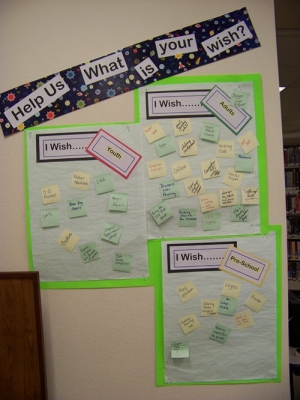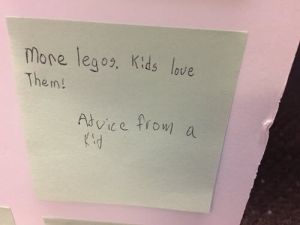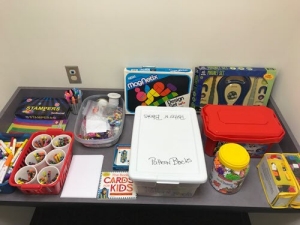Quick Wins Through Community Discovery

Photo: Wish Board at Poy Sippi Public Library
When libraries look to expand or revitalize the programs and services that they offer, they often turn to their community for inspiration and ideas. And the best way to learn what the community wants, is to ask, listen and observe! Using a design thinking approach, libraries can apply a variety of community discovery tools, such as dot boards, intercept interviews, or interactive workshops to gather insights into the needs and aspirations of community members. With a deeper understanding of the community, libraries can explore the possibilities for responding to community members’ ideas and suggestions.
As you gather a range of ideas during the discovery process, some will seem feasible and innovative, but will still take time and energy to realize. However, among those ideas there may be some "quick wins"—things the community desires that you could implement without much time and money. Consider putting these ideas into action right away. Your community will appreciate your responsiveness and willingness to listen to their suggestions.
The 15 rural and small public libraries participating in the Small Libraries Create Smart Spaces project are nearing the end of their community discovery phase and preparing to move into action planning. Even though the completion of their "smart spaces" is still months away, some of the participants were able to implement their own quick wins in the meantime.
The community discovery process for the Poy Sippi Public Library in Poy Sippi, Wisconsin, yielded many suggestions and even a few surprises. When Library Director Jeanne Williamson hosted their first community meeting, she discovered that the closing of the town’s café had left residents without a place to gather. “The library would be perfect for that,” said Jeanne. She also discovered something else important to her community: Coffee! “I also didn’t appreciate the importance of coffee; one thing that was universally agreed on.” Jeanne decided that she could combine those two wishes from her community by offering up the library space for residents to meet and bring their own coffee to enjoy. The library has recently taken their quick win one step further by providing a Keurig coffee machine “for anyone who needs a quick cup of joe.”

Photo: Lopez Island Public Library, request for more Legos
Allison Shimek, Library Director at the Fayette Public Library in La Grange, Texas, was also surprised by how many responses she received asking for coffee during their community discovery process. As a quick win for the library, she also purchased a Keurig coffee maker to have available in the library’s meeting room. “The moms have really appreciated it,” said Allison. The library is also in the process of purchasing a coffee/tea cart or stand since so many patrons requested the amenity.
La Grange also has a large homeschool community. Through the discovery process, Allison realized the library had not connected with them, so she met with a group of homeschool parents about their specific needs. From that meeting, she was able to compile a list of titles the library did not currently have that would be a valued part of the homeschool curriculum. Allison was able to purchase a number of the titles right away. They have been circulating well, not just with homeschool parents, but with tutors and other community members as well. “This was another easy win for us that was not difficult,” Allison says. “I am fortunate that my book budget allowed me to purchase some of the books their curriculum used.”
On tiny Lopez Island in Washington State, Programs and Art Coordinator Malia Sanford discovered her community wanted to see “improvements in the children’s area.” Curious as to what those “improvements” could be, she embarked on additional, targeted discovery. According to Malia, “An overwhelming amount of responses included removing the AWE Learning computer. So we did!” This created space for a small table with coloring supplies and toys. “Every time I have walked by, someone (both kids and caregivers) has been sitting and working on a project there. That was easy!” Malia also discovered that there was a desire for “more Legos.” In true serendipitous fashion, a grandparent came in to ask if the library would like some Legos she wanted to donate. Malia noted, “I may have been more hesitant to accept the donation if I hadn’t heard that feedback.”

Photo: Creative project materials at Laurel Public Library
The idea of the quick win was something that really resonated with Abby Davis, Youth Librarian at the Laurel Public Library in Laurel, Delaware. She used observation as a means of community discovery and found that the library has had increasing issues with older kids, ages 9–12, commandeering the space designated for younger kids (ages 0–8) and their caregivers. “We have two AWE Learning computers in this room. The older kids were drawn to play with the kitchen and the puppets, but also those computers, big time.” The library recently received a $1,000 grant to purchase digital equipment. They plan to purchase tablets and load them with apps and games aimed at the older age group.
That quick win will help address the space issue, but for an even quicker win, Abby decided to tackle some inaccessible space in the library. “Our public space should be for use—doors should not, by default, remain locked. One room in particular was always locked, never used, and it’s prime space.” When the library director gave the okay to open it up, Abby was thrilled. She filled the room with fun projects and engaging materials that she knows will attract the 9–12-year-old crowd, but hopefully a wider range of ages as well. She has already observed kids of all ages utilizing the materials, which include bracelet making materials, coloring supplies, toys, and more. Abby hopes to continue to find uses for this newly opened space, and to provide themed project materials and activities for all ages.
To learn more about community discovery tools, check out the recorded WebJunction webinar Getting to the Heart of the Community Through Discovery. You can also learn more about the libraries participating in the Small Libraries Create Smart Spaces program on the project page.
Toolkit for Creating Smart Spaces
WebJunction offers a toolkit to help you re-envision your library’s place as a center of community learning. Explore more of the Toolkit for Creating Smart Spaces.
